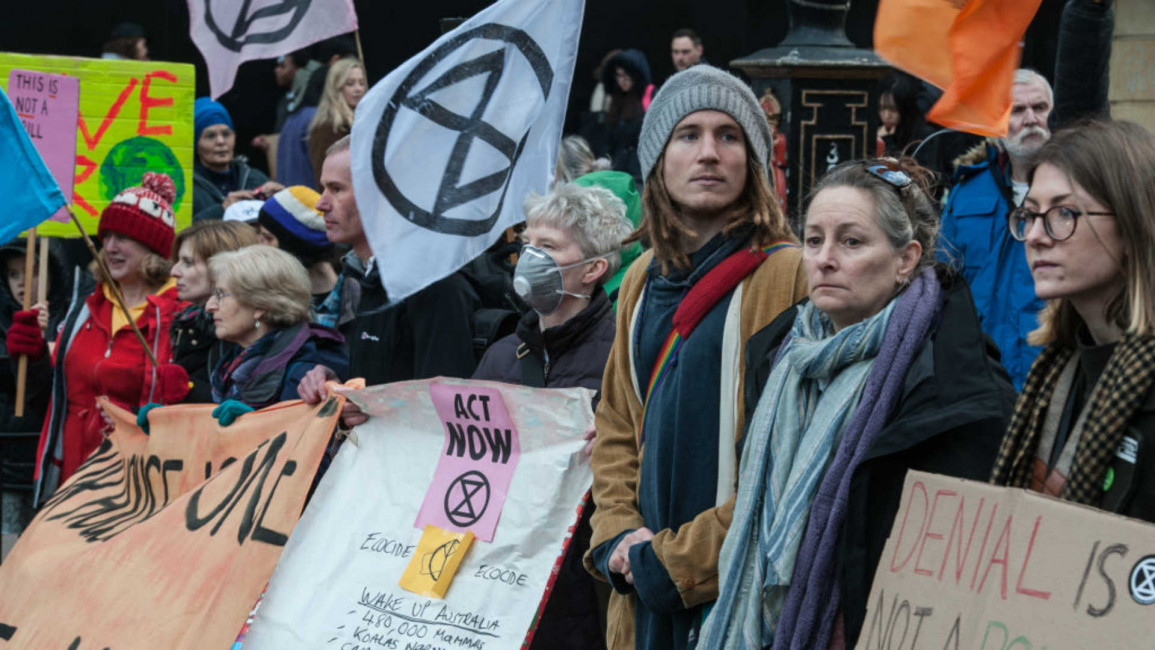
Take it from Britain's Muslims, it's not Extinction Rebellion that's the problem, it's Prevent
The 12 page guide issued by police included a profile on the non-violent group, calling it a threat due its "anti-establishment philosophy", and warning readers - police officers and teachers who are legally obliged to report 'signs of extremism' - to be on the lookout for people speaking, "in strong or emotive terms about environmental issues".
The backlash that ensued led to the document to be recalled and figures from Keir Starmer, a candidate for the next Labour Party leadership, to Sir Peter Fahy, a previous head of Prevent, to publicly condemn the decision and Home Secretary, Priti Patel's, defence of it.
Police declared the decision to include the group a mistake, and commentators on social media spoke out against the danger for climate change activists and the responsibility of Johnson's government.
But this discussion has - for the most part - ignored the heart of the matter; it is not XR's addition to the extremist list which is the problem here, but the Prevent scheme itself.
Also overlooked is the fact that Prevent cannot be laid at Johnson's door alone, as it has been in place for nearly 15 years. Why, after so much criticism, does the scheme exist? The answer will be an uncomfortable one for many; until now, it has focused primarily on children from a Muslim and ethnic minority background.
Prevent was launched in 2006 under the New Labour government as one of the four strands of the counter-terrorism strategy 'Contest'. Since then, it has been widely condemned for being both ineffective in its mission to combat extremism, and discriminatory towards Muslim children and young people in particular, encouraging a climate of distrust and suspicion in state institutions.
 |
It isn't enough, as some have argued, to only contest the inclusion of climate change activists on the extremist list |  |
Students have protested the implementation of Prevent in universities, and highlighted how it targets a marginalised group of students who already face discrimination on campus. The state-backed racism it promotes sends the disturbing message that all young Muslims need to be watched, for fear of radicalisation.
In 2016, the National Union of Teachers voted in favour of scrapping Prevent, and speakers voiced the need to "Stop education professionals being the secret service of the public sector."
Twitter Post
|
A secret database run by counter-terrorism police with sensitive and personal information on citizens as young as primary school children is still in place, even though only 1 in 10 reported radicalisation cases has resulted in specialist support.
Despite this policing and reporting being a long and painful experience for Muslim communities, many have seemed to approach the scheme as being a necessary evil for battling "extremism," a term that is open to interpretation and individual prejudice, since it has not been defined by law.
It's no wonder then, that Muslim children are disproportionately targeted, when studies show 31 percent of the British public believes Islam to be a threat to the British way of life.
Extinction Rebellion had a brief appearance in Prevent's guide to reporting extremist ideology, and the decision was quickly reversed when it came under criticism.
In contrast, after over a decade of the scheme targeting Muslims and other minorities, as well as trade unions, teachers, charities and students calling for the scheme's closure, it's still seen as a legitimate use of police force.
To understand the reasoning behind this, it is worth looking at XR's track record when it comes to people of colour. The activist group, in a reflection of the environmental sector as a whole, demonstrably lacks inclusion of black and brown activists.
Its core strategy - to sacrifice activists to arrest - ignores the reality for ethnic minorities in Britain; more than half of young people in British prisons are from a BAME background. Black and ethnic minority young people do not have the luxury of seeking out arrest to protest, safe in the knowledge they will be treated fairly by the system. The public outcry over the treatment of XR and not other activist groups and children is a chilling reminder of this.
Prevent's targeting of XR is not an "error of judgement" but the result of a racist and oppressive scheme that has been allowed to reign unchecked through five successive governments. It has been largely ignored because until now it has only affected ethnic minorities and Muslims.
As others have argued, the governments's counter terrorism strategy is heading in a more aggressive and broader direction as it targets the "far-left" and "anti-imperialism" under the wider bracket of "hateful extremism".
 |
Black and ethnic minority young people do not have the luxury of seeking out arrest as protest |  |
This, as with radicalisation with British Muslims, is easily stereotyped. How do we protect our communities against this? By protesting the scheme as a whole.
It isn't enough, as some have argued, to only contest the inclusion of climate change activists on the extremist list. Prevent itself, is a system reliant on prejudice and interpretation and in an increasingly racist country, rotten to the core.
Aniqah is a freelance journalist based in Manchester. Her work has appeared in The Independent, gal-dem and Exeunt Magazine. She also writes fiction and poetry and has been published in several anthologies.
Follow her on Twitter: @aniqahc
Opinions expressed in this article remain those of the author and do not necessarily represent those of The New Arab, its editorial board or staff.




